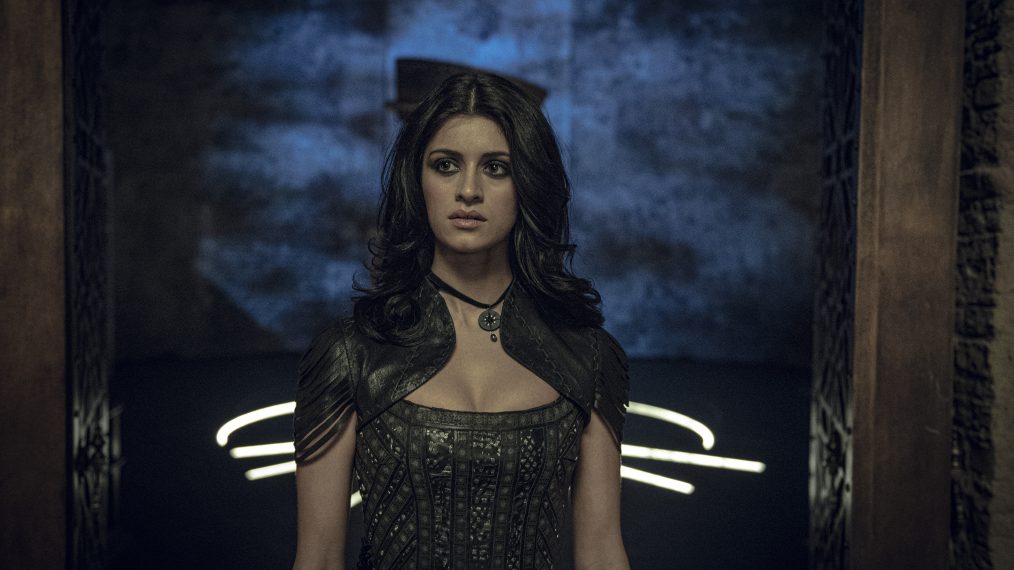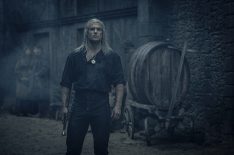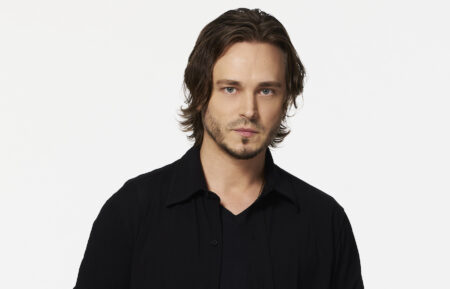‘The Witcher’ Episode 3 Might Include the Best Fight Scene of the Year (RECAP)

Spoiler Alert
[Warning: The below contains MAJOR spoilers for The Witcher Episode 3, “Betrayer Moon.”]
The Witcher continues to astound me. I honestly never expected to enjoy the show this much. All that “the next Game of Thrones” hype filled me with dread rather than anticipation. At best, I thought it might be some mindless B-movie fantasy schlock to pass the time over the holidays. I didn’t expect it to have thematic depth. I never realized how strong the casting was. I certainly didn’t expect it to be as funny as it is. And the fight scenes! Wow! I’m not even a big “action” guy — combat scenes usually have to be mind-blowing to impress me. The Witcher‘s fight scenes give me that same thrill I had when I first saw Mad Max: Fury Road.
“Betrayer Moon” (written by Beau DeMayo) not only features the best fight scene yet, but it continues to expand The Witcher-verse in ways that I never even considered. I thought I’d got a grasp on the narrative in the previous episode when the story split into three separate threads. But we’re not just watching three separate story-threads, are we? We’re watching three different TIMELINES! Or, at the very least, two timelines. Yennefer’s story is definitely happening in the past, and I presume Geralt’s adventures are from the present. Therefore, Ciri’s story is perhaps happening in the future? I suddenly feel like I’m watching an episode of Netflix’s Dark.
Let’s start with Geralt’s (Henry Cavill) timeline. He is summoned to the wintery kingdom of Temeria, where, for years, a beast has stalked the land, feasting on innocent citizens. It’s a monster so powerful that another Witcher was killed trying to defeat it. The King of Temeria, Foltest (Shaun Dooley), has done very little to stop the problem, which is causing unrest amongst his people, many of them on the verge of an uprising. Geralt enters this volatile situation with a promise to rid Temeria of its pest problem, only to be met with resistance, political underhandedness, and royal secrets.
After examining the body of the slain Witcher, Geralt realizes the beast isn’t what he originally assumed. He recognizes the handiwork of a Striga — a female monster made via a curse, born from the womb of a woman who died during childbirth. “An overgrown abortion,” in Geralt’s words. Triss Merigold (Anna Shaffer), a sorceress and mage to King Foltest, tells Geralt that the Striga is the daughter of the King’s late sister, Adda, and therefore, a rightful heir to the throne. Triss, who seems to be one of the most moral characters we’ve met so far, doesn’t want Geralt to kill the beast; she wants him to help her save it.
What unfolds is a story of incestuous siblings, secret lovers, and emotional betrayals. In turns out, Foltest and Adda were in love, their affair a shameful secret that Adda took to the grave. Foltest is the father of the cursed child, hence his reluctance to have it killed, despite the devastation it’s causing. This incestuous relationship angered Lord Ostrit (Jason Thorpe), a member of Foltest’s court who was in love with Adda, and so he cursed them with an elven spell he learned from a mysterious sorceress (I bet four marks this turns out to be Yennefer). Although, it’s also implied the curse could have come from the siblings’ mother, who disapproved of their relationship.
Geralt sniffs out Ostrit’s part in all this, and so, Foltest gives the Witcher his blessing to try and save his daughter and reverse the curse. Ostrit is ripped apart by the monster when Geralt uses him as bait to lure the Striga out of hiding. And let me tell you, the Striga is a gloriously horrific piece of work up close. She sort of looks like the Xenomorph from Alien but with wiry hair. And as I mentioned up top, the fight scene between Geralt and the Striga is spectacular in its choreography and direction (credit to director Alex Garcia Lopez). It’s an intense, gory, high-octane showdown that wouldn’t feel out of place in a video game.
But what makes the fight so compelling is that it’s not a battle to the death. Geralt is not trying to kill the beast, merely keep it occupied until dawn breaks to lift the curse. And just when it looks like he’s succeeded — as the curse wears off and the beast awakens in the skin of a terrified young girl — there is one more ferocious strike. The girl has not yet fully returned to human form and uses her clawed hand to attack Geralt before biting a chunk out of his neck like a deranged zombie. Of course, Geralt survives, as killing him off would be silly. But it’s a good sign that our hero is not infallible or impervious to pain.
The other thing that makes this story — and particularly the closing scenes — so effective is how it ties to Yennefer’s (Anya Chalotra) arc. Before Geralt heads into battle, Foltest asks him if his daughter will ever be normal. The Witcher tells him that she will need special care. “She’s lived as an animal. All she’s ever known is rage and hunger,” he says. The world has viewed her as a beast her entire life, and, as Geralt makes clear, this isn’t the first time he’s tried to save a princess who others see as a monster (referring to Renfri). And this is something Yennefer can relate to — she is seen as a monstrosity, a freakish “hunchback” who has only ever known poverty, abuse, and anger.
This is what makes Yennefer’s decision this episode so tragic, and yet, at the same time, strangely empowering. All she’s ever wanted is to be loved, to fit in. She thought she finally found those things at the Aretuza Witch Academy. Not only has she learned to harness her powers, thereby earning the respect of Tissaia de Vries (MyAnna Buring) and the right to graduate, but she’s fallen in love with Istredd (Royce Pierreson). The couple is now sleeping together, usually in front of a conjured audience of appreciative onlookers. Hey, I’m not going to kink shame, although I did think for a second it was about to turn into that scene from Midsommar — you know the one.
However, Yennefer’s world quickly crumbles apart. Each graduating mage is assigned to a King, and Yennefer is promised King Virfuril (Ben Lambert), who rules of Aedirn, the kingdom in which she was born. This is an exciting prospect for Yennefer, being able to return home in a position of power, never to be the girl she once was ever again. But the dream is snatched away from her when it’s discovered she has elven blood. Master Stregobor (Lars Mikkelsen) and The Chapter* of sorcerers and sorceresses think she’d be better served in Nilfgaard, rather than Aedirn, where discrimination against elves still exists.
*It was this Chapter scene when I realized we were definitely in the past. The group talks of events that have yet to happen, and they mention Princess Calanthe, who, as we know, was the Queen in Ciri’s story-thread (not to mention deceased by the end of the premiere).
It doesn’t take long for Yennefer to realize that she was betrayed by Istredd — the only other person she told about her elf heritage. She’s rightly furious and even misses the witch initiation so she can confront her deceitful boyfriend. Istredd asks for forgiveness, claiming not to have known how the information would be used. He says they can forget about all this and travel the continent together as he explores the world. “A new destiny,” he promises. Yennefer is not convinced: “A life holding dustpans while you brush off forgotten bones? That is not destiny. That’s slow suicide.”
Istredd could never understand or relate to what Yennefer has been through in life. “My world is cruel, unpredictable. You enter, you survive, you die,” she snaps. Istredd doesn’t get it, he claims she is playing the victim and just angry because she lost her chance to be beautiful. “I want to be powerful,” she retorts. Istredd tells her that no amount of power or beauty will ever make her feel worthy. It’s a nasty, cutting argument, on both ends, and one that leads to Yennefer making a drastic decision.
While all the mages dance the waltz with their newly assigned Kings*, Yennefer visits the artist, Giltine (Julian Rhind-Tutt), a sort of Shakespeare-in-leather-looking-character who can transform people’s looks. She demands he prove his artistry by making her beautiful, leaving only her eyes and scars as reminders of her past. The enchantment that follows is essentially a form of torture, a brutal surgical procedure that comes at a significant cost. For it to work, Yennefer has to have her womb removed, meaning she will never bear children.
*This is were we see Foltest and Adda as CHILDREN, confirming that we’re most definitely in the past.
This barbaric procedure is intercut with Geralt’s fight with the Striga. We flip back and forth between the two, as the chilling screams of Yennefer and the Striga meet in cacophonous harmony. It truly is an extraordinary sequence, simultaneously impressive and hideous. I mean, Yennefer’s transformation is pure spine-cracking, blood-oozing body horror. And the contrast here is purposeful. Yennefer and the Striga both lay on the floor in the fetal position, two women who have lived and been treated as animals, now reborn.
Yennefer strides into the dance with newfound grace and poise. Her spine is no longer curved, her jaw no longer deformed. She walks up to King Virfuril and introduces herself as Yennefer of Vengerberg, stealing a dance and the Aedirn mage position from another girl. This new Yennefer is not a pushover anymore. She is taking power for herself.
The first two episodes of The Witcher were very good, but this one is something else entirely — dark, grimy, and intense. If the season continues at this level, then The Witcher might just make itself a late argument for my favorite show of 2019.
Additional Notes
- Princess Ciri (Freya Allan) doesn’t appear until the very end of the episode, where she walks towards a forest, almost possessed by whispers coming from beyond the trees. And poor Dara (Wilson Radjou-Pujalte) takes an arrow to the shoulder trying to run after her.
- I like how Roach gets a small moment to shine in each episode, this time left behind as collateral for lodging payment (after Geralt spent the night with a prostitute). “Don’t judge me,” Geralt tells his trusty horse companion.
- “You’re a first draft of what nature intended you to be,” Giltine tells Yennefer. Harsh.
- “I envy you, Witcher, to live and never have to fall in love,” Foltest says. Based on Geralt’s silent reaction, I don’t think that is true at all. Even though Geralt says that all life needs to be is “monsters and money,” there is obviously more going on beneath the steely exterior.
The Witcher, Season 1, Streaming, Netflix












